|
WMA to enter mass scale compost market:
Composting comes in handy to manage solid waste in WP
By Ranil WIJAYAPALA
|
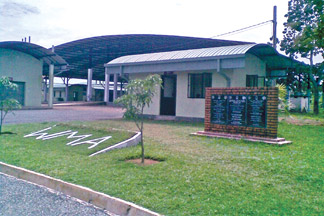
Nogoda, Pohorawatta compost facility
|
A few years back, when heaps of garbage gathered on a daily basis
from the households in the Western Province, the most populated province
in the country, people never thought that those heaps of garbage one day
would become mountains of garbage and pose a social and environmental
threat in the country.
It was only after these heaps of municipal waste invaded valuable
lands in the Western Province that the local authorities frantically
began to search for lands to dump their municipal waste; the authorities
realised that the municipal waste is a serious issue to be tackled with.
As local government bodies, the sole authority on the waste
collection in the country ran out of solutions for the municipal waste,
the central government had to intervene in the issue of waste management
as it became more of a national issue in the country going beyond the
capacities of the local authorities.
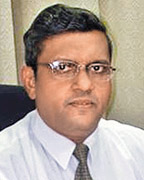 |
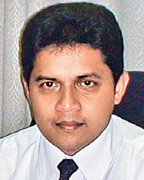 |
Priyantha
Samarakkody,
Director WMA |
Nalin
Mannaperuma,
Deputy Director WMA |
The 'Pilisaru' program initiated by the Environment Ministry in 2008
was the national level program launched to tackle the issue of solid
waste management in the country.
The solid waste management has become a serious issue in the Western
Province as it generates more than 3,500 metric tonnes of solid waste
daily which is equivalent to 60 percent of the national waste
generation.
The shortage of dumping sites for the local authorities to dump these
garbage has worsened the situation as open dumping sites create huge
environmental and health issues in the province that eventually ended up
in the judiciary as there was no proper solution for those issues.
Therefore, systems and mechanisms have to be evolved to overcome this
issue of municipal waste and rid this issue systematically from our
environment. The Local Authorities were given the technical know-how and
the required funding to tackle this issue and made use of this municipal
waste as a resource.
When the Central Environment Authority under the central government
was finding solutions for the issue at national level the Waste
Management Authority of the Western Provincial Council also stepped
forward in solving the issue within the Western Province itself where
the problem was so acute.
The Waste Management Authority which adopted a five year action plan
in 2010, introduced seven steps for the solid waste management in the
province, namely the management of waste at source, proper
collection/acceptance of waste from the generating point, cleaning of
streets and public places, providing of adequate infrastructure
facilities, improved system of waste transportation, use of collected
waste as a "resource" and the providing of proper final disposal
facilities.
The WMA objective behind the implementation of the seven steps in
solid waste management is to understand and identify groups and
individuals responsible organisations or people to perform waste
management programs within the Western Province.
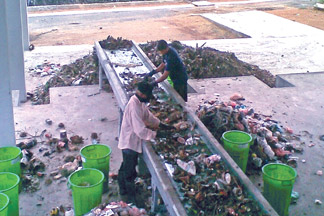
Sorting garbage at the site prior to composting |
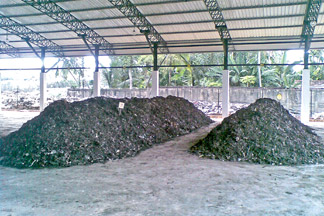
Composting in process |
According to Deputy Director of the Waste Management Authority Nalin
Mannaperuma, those seven steps were adopted to manage the solid waste
from generation to final disposal. The Waste management Authority took
the responsibility of implementing the 6th and 7th steps to use waste as
'resource' and providing final disposal facilities. The respective local
authorities were made responsible for the implementation of the other
five steps except for the first step which was the responsibility of the
general public.
"We have a five year master plan for the entire Western Province and
we have given priority for the Colombo district because the waste
problem is very much severe in that district. Coming to the Kalutara
district, the basic information reveals that 16 Local Authorities in the
district are collecting 150 metric tonnes of garbage per day," he said.
"Actually right now there is no proper final disposal facilities for
many local authorities in the Kalutara district. Therefore, they are
compelled to dump their garbage in open dumps and these open dumps have
created a lot of problems to the environment such as air pollution,
water pollution and ground water pollution. Then it also affects the
aesthetic beauty of the area. All those problems are linked with the
improper handling of municipal solid waste", he added.
Out of these seven steps in waste management, the sixth step is
important and it focuses on using waste as a resource.
"That is a very important step and once people sort garbage at source
there is huge potential to use this garbage as a resource.
To do that actually we introduce different kinds of techniques,
programs, to use waste as resource not only at the generation level even
at the local authority level and some times at provincial level", he
added.
Considering the characteristics of the waste generation in the
Western Province, 60 to 70 percent of the waste are perishable waste and
another 15 to 20 percent is recyclable waste.
"Perishable waste is that is the most difficult part to manage,
because Sri Lankan garbage has a high moisture content around 60 to 70
percent and also we are living in the tropical environment condition.
Therefore if we do not properly manage and collect the garbage there is
a tendency for the garbage to rot in very short period. Therefore,
within six to eight hours we have to collect all the garbage otherwise
it will start decaying process", Mannaperuma added.
This situation may create huge environmental issues.
"Therefore, to tackle this the WMA is promoting composting project,
bio-gas generation program and making animal feed out of food waste.
These three options are available for the managing of perishable waste
and out of these making compost can be practised at the Local Government
level", he added.
The composting of perishable waste is also implemented at different
level at household level and local authority level.
In the 16 Local Authorities in the Kalutara, eight community level
waste composting facilities have been established and in the entire
Western Province 20 such programs are being implemented by the Local
Authorities.
"It is not only the Waste Management Authority of the Western
Provincial Council which is supporting these programs, the Pilisaru
project of the Central Environment Authority under the Environment
Ministry also supporting these local government bodies to implement
these composting facilities", Mannaperuma added.
Apart from these composting facilities handled by single local
authorities, mass scale composting facilities operating on commercial
level are also available within the province.
Those facilities can handle more than 25 metric tonnes per day and
they cater the service not only for one local authority but for two or
more local authorities.
"Since this facility cater to more than one local authority, no
Chairman can get the responsibility of that facility. Under that
circumstances the WMA takes the responsibility of handling and managing
such kind of waste management facilities within the province", he added.
Under that basis the WMA identified the requirement of mass scale
waste processing facility for the Kalutara district and the Nagoda solid
waste dump operated by the Kalutara Urban Council was selected to
implement such mass scale composting facility as Kalutara Urban Council
and Kalutara Pradeshiya Sabha and the private parties used to dump more
than 30 metric tonnes of waste to this site on daily basis.
"Therefore requirement was there to establish a waste processing
facility but we had problem with regard to funding for this project.
'Pilisaru' the national waste management program, identified the
potential of having such a big facility there and they invest Rs. 90
million to establish this facility", Nalin Mannaperuma added.
"The capacity of this facility is 60 metric tonnes per day and we can
manufacture 60 metric tonnes of compost easily under this project. With
the generous support given by the Pilisaru project which was started in
March 2011 and technical assistance and machinery to run the place at
the designed capacity were also provided by the Pilisaru project", he
added
Now, the Waste Management Authority is undertaking the whole
operation of the facility after it was handed over to the WMA by the
Environment Minister Anura Priyadarshana Yapa, Central Environment
Authority Chairman Charitha Herath and Director of the Pilisaru project.
"Presently we are taking more than 35 metric tonnes of mixed garbage
from the Kalutara Urban Council and the Kalutara Pradeshiya Sabha and at
the site we have sorting mechanism. We have employed around 16 site
workers, site manager and a supervisor. Altogether 18 people are working
under this facility to perform this facility", Mannaperuma added.
This facility can go up to 60 metric tonnes per day and there is a
possibility of taking the garbage from Panadura Urban Council and
Panadura Pradeshiya Sabha too for this facility.
"For the WMA, we have a five year action plan from 2010 to 2016 and
under this action plan we have planned to convert 30 percent of the
perishable waste to valuable compost. That means by 2015 we have to
convert 44 metric tonnes of perishable garbage into compost per day.
With the implementation of Nagoda, Pohorawatta composting facility we
almost achieved that target since this site alone can convert 60 metric
tonnes of perishable garbage in to compost", he added.
After almost 15 months of operations by the WMA at the Nagoda,
Pohorawatta composting site it is now in the process of releasing the
compost produced there to the market.
If proper techniques are followed when making compost, for example
making big heat during the composting process to kill all those germs
and unfavourable micro bacteria a high quality compost can be produced.
If such a process is not followed we can't get high quality compost.
"At Pohorawatta site we are following these techniques and we have
very well trained officers and technical officers to operate this
composting facility. Therefore we can assure that the compost produced
here is of high quality. Not only that, we take the samples of the
compost to the Gannoruwa Agricultural Research Institute for analysis.
Those samples say that actually it has good NPK (Nitrogen, Prosperous
and Potassium) value and the other important characteristics are within
the standards. Sometime they are beyond the specific standards.
Therefore, we can assure that we are producing very good quality compost
at our site", he added.
"Now we are in the production process and we are above to market
these production next month. We are planning to have a formal function
to release our product to the market under the product name Mihisaru",
Mannaperuma added.
"This is the first time that the Waste Management Authority is
directly involved in the compost manufacturing process and this is the
time we are going to sell our products to the market", he added.
The WMA registering some dealers to market 'Mihisaru' compost in 50
Kg, 20 Kg and 10 Kg packs through registered dealers in the Western,
Sabaragamuwa and Southern provinces.
"Currently we produce 80 metric tonnes of compost per month and we
expect to expand this production capacity up to 150 metric tonnes of
compost with the acceptance of the garbage from Panadura Urban Council
and the Panadura Pradeshiya Sabha", he added.
The project is being implemented under the blessings of the Chief
Minister of the Western Province Prasanna Ranatunga, other Provincial
Ministers, Councillors, officials of the Provincial Council and the
Chairman of the WMA, he added.
One of the important features of the project is that the WMA has
prepared a separate environmental pollution monitoring and environment
pollution mitigation mechanism within this site. "We are monitoring and
taking measures to avoid any health hazard and environmental issues
around the site", he added.
According to Priyantha Samarakkody, the WMA is planning to convert
820 metric tonnes of perishable waste into compost by 2016 with the
improvement and strengthening of the existing composting facilities run
by the local government authorities in the Western Province and by the
WMA itself.
"Compost is very popular among the people of Sri Lanka. Therefore, we
started use waste as a resource with composting. We have to use very
simple technology and any one can understand that process and it is easy
to operate also. The other thing is that we are agricultural based
country. As one of the solutions we introduced composting. In future we
have to go for other possibilities as well", he added.
"Our target is to improve those facilities to accommodate at least
1.5 to 2 times in respect of the designed capacity. For that we are
obtaining Korean technology and Korean cooperation to introduce advance
technology into them. Likewise our intention is not to increase the
numbers but to improve the capacities of the existing facilities", he
added.
"At the moment we have enough demand for the compost we produce at
our facilities. In future this can be used for landscaping activities
and that can be used for other purposes also. Anyway this will not be a
big problem for us to dispose the quantity of compost generate at our
composting sites since there is a growing demand for compost. This will
also help us to manage the solid waste in the Western Province too very
effectively", he added. |

